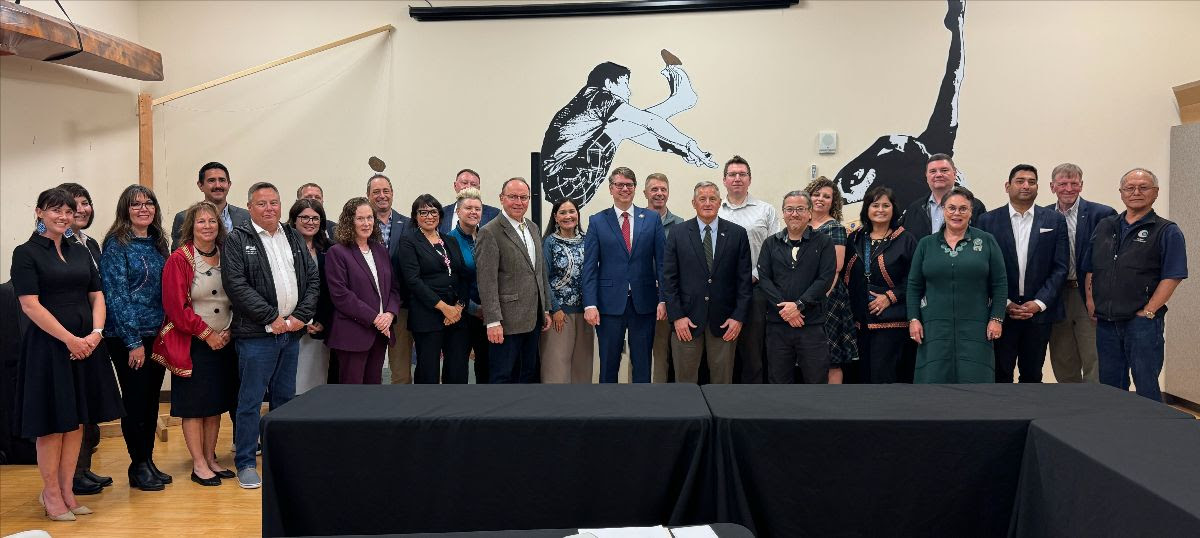
- Details
- By Native News Online Staff
The Alaska Federation of Natives (AFN), the ANCSA Regional Association (ARA), and the Alaska Native Village Corporation Association (ANVCA) took part in a roundtable discussion with the House Committee on Natural Resources on Wednesday, August 27, at the Alaska Native Heritage Center. The event focused on pressing issues impacting Alaska Native communities.
The House Committee on Natural Resources holds wide-reaching jurisdiction affecting Alaska Native people, particularly through its Subcommittee on Indian and Insular Affairs. Committee Chair Rep. Bruce Westerman led the delegation, joined by Vice Chairman Rob Wittman and Representatives Paul Gosar, Pete Stauber, Tom Tiffany, Harriet Hageman, Val Hoyle, Celeste Maloy, Sarah Elfreth, and Randall. Together, they traveled to Alaska to hear directly from Native leaders.
"Engagement with Members of Congress is essential to ensure that the voices of Alaska Natives are heard regarding the management and stewardship of our lands and resources," said Ben Mallott, AFN President. "Our traditional and cultural ways of life must be fully understood and respected by policymakers, and that means hearing directly from us. Alaska Native communities are best positioned to balance protecting our traditions and pursuing economic development for the benefit of future generations."
The roundtable served as a valuable opportunity for open dialogue between Alaska Native leadership and congressional members about key issues involving public land policy, conservation efforts, economic development, and natural resource management. The organizations expressed appreciation to Rep. Nick Begich for coordinating the visit, ensuring that the committee members heard firsthand from those most affected by federal decisions.
“These roundtables are vital to helping policymakers understand the unique organizational structure created under the Alaska Native Claims Settlement Act and the role Alaska Native corporations play in that structure,” said Nicole Borromeo, ANCSA Regional Association President. “ANCSA is a living policy that must continue to adapt to meet the needs of our communities. Alaska Native people are best positioned to guide these changes, so the law remains a foundation for cultural strength, economic development, and the well-being of future generations."
Attendees engaged in a thoughtful and productive exchange, addressing natural resource issues critical to Alaska’s future. These discussions are essential for crafting policies that promote environmental sustainability while honoring cultural values and supporting community well-being.
"ANVCA thanks Rep. Begich and the Committee for their swift work on H.R. 43 – the Alaska Native Village Municipal Lands Restoration Act of 2025," said Curtis McQueen, Executive Director of ANVCA. "Our communities are best positioned to determine the right use of our lands, and we welcome roundtables like these to continue educating policymakers on the uniqueness of our state and the land use policies that directly impact daily life in our villages."
Thanks were also extended to the Alaska Native Tribal Health Consortium for contributing to the discussion and emphasizing the vital role of healthcare access in rural Alaska in ensuring long-term community stability and health.
These conversations underscore the strength and determination of Alaska Native communities and highlight the critical need for collaboration with policymakers to support and protect cultural heritage while fostering sustainable opportunities for future generations.
More Stories Like This
Native News Weekly (August 25, 2024): D.C. BriefsNavajo Nation Mourns the Passing of Former Vice President Rex Lee Jim
Deb Haaland Earns Endorsement From Communications Workers of America Local 7076
University Soccer Standout Leads by Example
Two Native Americans Named to Democratic Congressional Campaign Committee's“Red to Blue” Program
Help us defend tribal sovereignty.
At Native News Online, our mission is rooted in telling the stories that strengthen sovereignty and uplift Indigenous voices — not just at year’s end, but every single day.
Because of your generosity last year, we were able to keep our reporters on the ground in tribal communities, at national gatherings and in the halls of Congress — covering the issues that matter most to Indian Country: sovereignty, culture, education, health and economic opportunity.
That support sustained us through a tough year in 2025. Now, as we look to the year ahead, we need your help right now to ensure warrior journalism remains strong — reporting that defends tribal sovereignty, amplifies Native truth, and holds power accountable.
 The stakes couldn't be higher. Your support keeps Native voices heard, Native stories told and Native sovereignty defended.
The stakes couldn't be higher. Your support keeps Native voices heard, Native stories told and Native sovereignty defended.
Stand with Warrior Journalism today.
Levi Rickert (Potawatomi), Editor & Publisher

